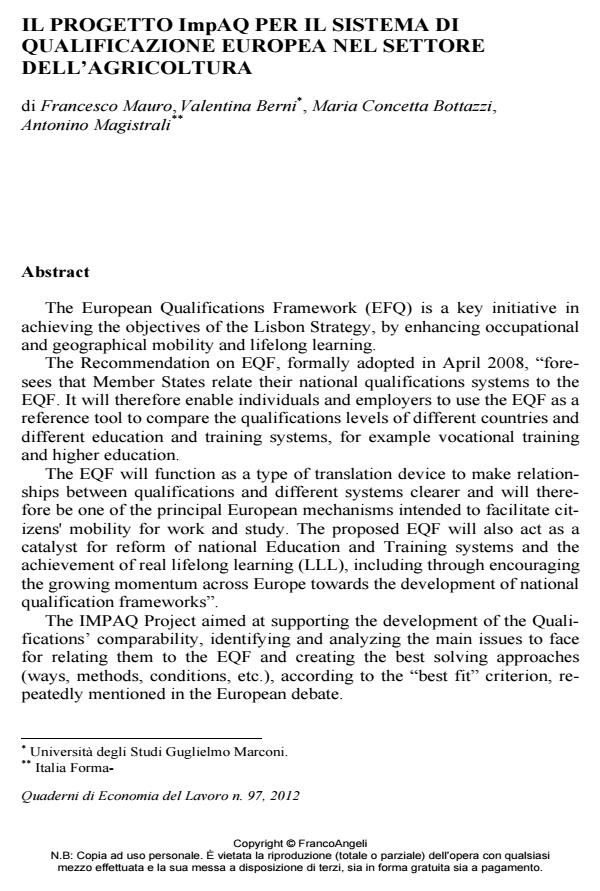Il progetto ImpAQ per il sistema di qualificazione europea nel settore dell’agricoltura
Journal title QUADERNI DI ECONOMIA DEL LAVORO
Author/s Francesco Mauro, Valentina Berni, Maria Concetta Bottazzi, Antonino Magistrali
Publishing Year 2012 Issue 2012/97
Language English Pages 10 P. 247-256 File size 882 KB
DOI 10.3280/QUA2012-097012
DOI is like a bar code for intellectual property: to have more infomation
click here
Below, you can see the article first page
If you want to buy this article in PDF format, you can do it, following the instructions to buy download credits

FrancoAngeli is member of Publishers International Linking Association, Inc (PILA), a not-for-profit association which run the CrossRef service enabling links to and from online scholarly content.
The European Qualifications Framework (EFQ) is a key initiative in achieving the objectives of the Lisbon Strategy, by enhancing occupational and geographical mobility and lifelong learning. The Recommendation on EQF, formally adopted in April 2008, foresees that Member States relate their national qualifications systems to the EQF. It will therefore enable individuals and employers to use the EQF as a reference tool to compare the qualifications levels of different countries and different education and training systems, for example vocational training and higher education. The EQF will function as a type of translation device to make relationships between qualifications and different systems clearer and will therefore be one of the principal European mechanisms intended to facilitate citizens' mobility for work and study. The proposed EQF will also act as a catalyst for reform of national Education and Training systems and the achievement of real lifelong learning (LLL), including through encouraging the growing momentum across Europe towards the development of national qualification frameworks. The IMPAQ Project aimed at supporting the development of the Qualifications’ comparability, identifying and analyzing the main issues to face for relating them to the EQF and creating the best solving approaches (ways, methods, conditions, etc.), according to the "best fit" criterion, repeatedly mentioned in the European debate. The sector and the related Qualifications investigated within the project has been the agriculture one. The occupations/professions in the sector of agriculture can be characterized in wide gamma of Qualifications, stimulated by a continuous change, since the sector faces more and more new cultural challenges and new economic and social scenarios, which require an intense regeneration process of enterprises and professionalities. The importance of this sector for most European States, as well as the presence of different Qualifications/Titles, corresponding to different professional complexities, have made it a significant environment for carrying out the comparability research, by analyzing the functionality of the referencing and the critical aspects and solutions created for the different levels. Since the very beginning it appeared clearly that the current national qualification systems have been developed over time in different national settings. All countries use the ten criteria for referencing national qualifications levels, according to the EQF advisory group, but there is large variety of approaches chosen in the member states, and the aspects of the learning outcomes are also in a different way implemented. To overcome these obstacles, the research strategy and the methodology adopted by the partners have been focused on the involvement of the stakeholders and the collection and analysis of the feedbacks came out from the interviews that have been conducted. Moreover to limit, describe and analyze the reality of the sector and its aspects of training and qualifications, specific tools have been created used, and implemented during the course of the project: "the Matrix", "the Bridge", and "the Ruler", as specifically described below. At present the research has been completed and the relating reports will be soon produced. They will summarize the results achieved and will include some recommendations, in order to continue and promote the analysis and the process of referencing, on the base of the experience gained during the project. These results will be presented at the project final conference organized in Paris during the performing of the Paris Agricultural Show (http://www.salon-agriculture.com), an international conference on agriculture focused on the exploration of all of agriculture’s richness and diversity in France and the rest of the world.
Francesco Mauro, Valentina Berni, Maria Concetta Bottazzi, Antonino Magistrali, Il progetto ImpAQ per il sistema di qualificazione europea nel settore dell’agricoltura in "QUADERNI DI ECONOMIA DEL LAVORO" 97/2012, pp 247-256, DOI: 10.3280/QUA2012-097012